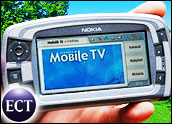
In yet another step toward the day when consumers everywhere will watch TV on mobile devices, mobile network operator O2 and broadcaster Arqiva have teamed up with Nokia to kick of the United Kingdom’s first trial of a full multi-channel mobile TV.
The trial will run for up to six months and is designed to test and showcase the televisual capabilities of next-generation mobile services. The study will explore how people choose to catch up on their favorite TV shows, watch the latest music videos, and stay abreast of news and sports when on the move. The study also seeks to understand how much customers are willing to pay for the service.
Mark Selby, Nokia’s vice president of multimedia, said the Oxford trial is an important step in the roll out of mobile broadcast TV, building on the recent successful trial in Helsinki, Finland.
“Consumer reaction and usage patterns will help the broadcast and mobile industries understand what content viewers want to see on this exciting new technology,” Selby said. “The Oxford trial will add valuable new research and it will be followed by multiple trials in Europe, Asia and America.”
Pushing Portable TVs
The service is based on the new DVB-H (digital video broadcasting-handheld) transmission technology and works by beaming a signal to a digital TV receiver, which is attached to Nokia’s new 7710 smartphone, transforming it into a portable TV.
O2 is offering 16 channels, including a variety of news, sports, travel, and entertainment programming. Customers may select their favorite programs from an on-screen service guide, search for specific items, and cause their headset to alert them when a show starts.
“We’ve pulled together an extremely strong and varied 16-channel lineup, reflecting the range of content that our original research identified as desirable for a mobile television service,” Hyacinth Nwana, Arqiva’s managing director, mobile media solutions, said. “In Europe all evidence points to mobile TV being mass market. Oxford will address the critical success factors such as scalability, consumer experience, content mix andconsumer choice.”
Searching for Revenues
Inside Digital Media senior analyst Phil Leigh told TechNewsWorld that mobile TV could eventually be a boon for mobile carriers, who are always looking for ways to gain incremental revenue.
“It’s certainly time to do field trials and see what happens,” Leigh said. “Ten years from now mobile TV will be more common. People will be watching it at restaurants, sports bars, subways, buses, airports. But it will probably be 20 years before it’s mainstream.”
Dave Williams, O2’s chief technology officer, is more optimistic. He predicts there will be many millions of mobile TV viewers worldwide by 2010. But he admitted there are challenges.
“As an emerging industry, mobile TV will require a willingness of operators, regulators, broadcasters and handset suppliers to strike new deals,” Williams said. “Regulators need to license new spectrum, which will allow global economies to exist, broadcasters and publishers will need to tackle digital rights issues and operators develop workable revenue sharing partnerships.”





















































